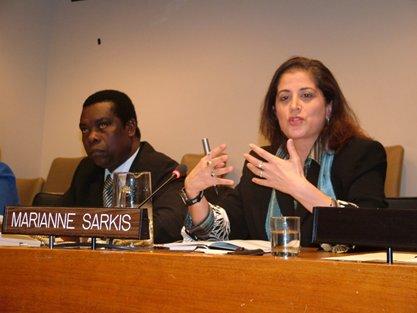
Biography
Marianne Sarkis is Assistant Professor of International Development and Social Change in the International Development, Community and Environment (IDCE) Department at Clark University in Worcester, MA. Marianne obtained her Ph.D. in 2010 from Florida State University. Her dissertation was supervised by Dr. Cheryl Ward and entitled "At Least Eight or Ten Children: The Paradox of Post-Resettlement Fertility among Certain African Communities in the USA. She earned her M.A. in 2000 from University of South Florida in Applied Anthropology and her B.A. in 1993 from Indiana University of Pennsylvania (IUP).
Dr. Sarkis is an applied medical anthropologist, an engaged scholar-activist, whose U.S.-based research examines the link between refugee resettlement policies, reproductive strategies and fertility changes. Sarkis' international work focuses on health in Kenya, and socio-economic development in Lebanon.
Marianne conducted her doctoral research in Central Massachusetts among Somali and Somali Bantu women on fertility rates changes after resettlement to the United States. In a year-long ethnography, she used a mixed-methods approach that attempted to identify micro and macro changes in fertility. Her dissertation involved in-depth interviews, surveys, participant-observation, and census data analysis. Her main finding, which has served as the basis of a policy brief she is currently authoring, is that the process of resettlement indirectly contributes to changes in fertility among African refugees through women's inability to access educational and employment resources due to linguistic and cultural limitations. As a result, many are unable to achieve self-sufficiency and become dependent on social welfare programs and public assistance. This unintended consequence moves women into a permanent state of dependence on their husbands, the welfare system, and their children for a semi-permanent support.
In 2009, while still conducting her doctoral research, Dr. Sarkis was invited to be a panelist at the DPI NGO Relations Cluster in the Department of Public Information at the Headquarters of the United Nations on the consequences of female genital mutilation (FGM). Her panel consisted of other scholar-activists who lobbied the United Nations for a more focused approach to addressing FGM in the United States, Europe, and Africa. The invitation to the United Nations was in recognition of research and activism she has been engaged in since 1995 on the issue of female genital mutilation in Africa and the Middle East, and of her work as Director of the FGM Education and Networking Project.
Since her dissertation, Dr. Sarkis has worked as a health researcher and logistics director in a medical team consisting of doctors, nurses, educators from Massachusetts that traveled to rural areas in Kenya to provide free health screenings for chronic diseases, cervical cancer, and breast cancer. The team also provided health education, and training in infant resuscitation through the Helping Babies Breathe (HBB) program, an international train-the-trainer model that teaches health providers prevention techniques for infant choking.
In summer of 2011, Dr. Sarkis initiated two international development programs in Lebanon to take place in 2012. The first will be conducted jointly with the American University of Beirut (AUB), and will involve co-teaching a course on urban development in war-torn cities. This collaborative US-Lebanon project will foster an environment of cultural exchange where students from the United States and Lebanon will meet virtually to discuss assigned readings and work collaboratively on projects. If circumstances permit, in 2012, Dr. Sarkis will take students from Clark University to Beirut where they will work with AUB students on urban development projects in Beirut.
The second Lebanon-based project is a partnership with a non-governmental organization in her family's ancestral village in North Lebanon. Over the summer, Dr. Sarkis conducted a needs assessment with local officials, regional representatives, and governmental ministers to identify specific development needs for the region. Stakeholders identified anthropogenic environmental degradation as a main threat to agricultural livelihood and socio-economic development. In collaboration with a local NGO, Dr. Sarkis applied for a grant from the United States Embassy in Lebanon. If funded, this program will train youth (13-18 years of age) to become aware of environmental challenges and sustainability in their district through a participatory "hands on" community beautification project in their respective villages. Participating students will learn about specific problems affecting their communities such as public waste, environmental degradation, governmental functions, community responsibility and civic engagement. The project is centered on an environment-based educational program that includes a series of workshops and group activities at an NGO with the assistance of local municipalities and community members. Participating youth will learn about the importance of maintaining a clean environment, how to conduct a community environmental audit on littering, and will plan and undertake a small-scale community beautification project with assistance from families and friends.
In the United States, Dr. Sarkis remains an engaged anthropologist who focuses on the integration and acculturation of African refugees, specifically Somalis and Somali Bantus, into American culture and the reproductive, health, and cultural changes they experience during this process. She currently serves as an advocate and a consultant for the Somali Bantu community that has recently resettled to Worcester.
At Clark University, she teaches quantitative and qualitative research methods, ideologies of "race" in development, social network analysis, and a number of data analysis courses.
